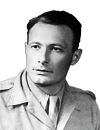 Warrant Officer Lagrange was the chief instructor of the Officer School in Salambo directed by Major Gandoet.
Warrant Officer Lagrange was the chief instructor of the Officer School in Salambo directed by Major Gandoet.
On his arrival at the 3rd Battalion of the 4th Riflemen, after the Tunisian campaign, Major Gandoet put him in charge of the physical training of the units.
Every morning he led the officers’ physical education session. During the Tunisian campaigns he was the Major’s bodyguard, put in charge by higher command of maintaining vital links initially with the German authorities, before the opening of hostilities, then afterwards, with various French and Allied general staff. They therefore spent several months living side by side, which gave rise to a growing feeling of mutual trust and respect.
Before the departure of the battalion for the landings in Italy, Warrant Officer Lagrange was posted to the motor vehicle department, as assistant to the Captain in charge of it.
After the landings at Naples, as the units were returning to their places in readiness for the fighting to come, the motor vehicle department, and the supply and fuel depots were moved into the Acquafondata basin.
As soon as the move had been completed, Warrant Officer Lagrange asked to rejoin his colleagues in combat, and he went to Major Gandoet’s H.Q., temporarily set up on the slopes near Olivella.
The Major replied:
He asked him to ensure firstly as a matter of urgency that all means of communication, principally radio, were working properly, and secondly that H.Q. was well organized and secure.
Warrant Officer Lagrange was present at the Major’s side, often sheltering behind the same small rock to protect himself from shells of all types, fired night and day throughout the fighting at Belvedere by the Germans, who held all the summits.
The Major went everywhere to see, reassure, and encourage his unit commanders, officers and above all the rank and file troops face to face, while always maintaining radio contact, especially with the artillery. Warrant Officer Lagrange, who had great physical stamina as a result of his intensive sports training, greatly admired the Major for the way in which he fulfilled his responsibilities in these very exceptional conditions.
The Major made Lagrange responsible for numerous contacts with the units and also for trips backwards and forwards between the riflemen and the H.Q. of the 2nd Battalion, which would be set up somewhere on the massif, to fetch ammunition, which was distributed to the companies in difficulties on his return.
Everything that happened during this period has already been described in numerous books, but what has not been recorded are the extremely powerful bonds that exist between people at times like these, which are strengthened in these very specific circumstances at the height of a battle such as Belvedere. Respect for the rules of life is sacred, and, at the end of this period, Warrant Officer Lagrange was once more put to the test when the battalion was relieved.
His account of events on 4 February 1944 is related on this site under the heading “The Relief of Belvedere, 4 February 1944“.
After this eventful episode, the battalion, under the command of Major Jarrot, regrouped and prepared to pursue operations.
The Major gave the same tasks to Warrant Officer Lagrange who was made Chief Warrant Officer on 25 February. With the units on the move towards Rome after the taking of Castelforte, it was very difficult to keep in touch with them, and it was direct contact with the forward units which was the most effective. The security of the H.Q., which was often on the move, also had to be maintained. The easiest routes were booby-trapped and mined.
Lance Corporal Brocero, from his Belvedere team, was killed by a mine. Beyond Castelforte, Major Jarrot was wounded and evacuated, to be replaced by Captain Camus.
Nothing changed for Warrant Officer Lagrange. Captain Camus kept him close by for the same missions. He was at his side when Captain Camus was killed by a piece of shrapnel.
Under Major Tochon who replaced him, Chief Warrant Officer Lagrange had the same brief until the fighting ended near the town of Sienna.
In Sienna, Lagrange received the good news of his promotion to the rank of 2nd Lieutenant.
The regiment was taken to a site near Naples where it set up camp in anticipation of the landings on the French coast.



